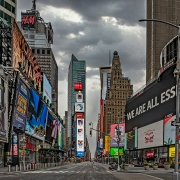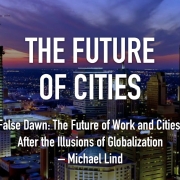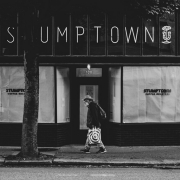Long COVID
This is a disease one should not underestimate, but let’s assume that the worst of the Covid-19 pandemic is past us, at least for now. The disease’s impact on economy, our way of life, the state of democracy and the world will resonate for years to come and could have some unexpected wrinkles.
Covid-19 was a major disrupter of virtually everything, but it also accelerated many things that were already in play. From the growth of the tech oligarchy to the dispersion of population to suburbs and to smaller cities, to a wide range of political impacts, it will continue to be felt here and around the world.
Great pestilences disrupt societies and economies. The plague undermined the Roman empire, as shown by historian Kyle Harper, creating the conditions that boosted the barbarian warlords who later became the Medieval aristocracy. The even more lethal plagues of the Middle Ages disrupted the great Mongol empire, at the time the largest in history, and, in conjunction with cooling temperatures, undermined the great Silk Road and ended the Pax Mongolica.
Yet not all effects were negative, at least in the long run. The mass die offs from the Plague undermined the old social order. “In an age where social conditions were considered fixed,” suggested historian Barbara Tuchman, the sudden shortage of labor was “revolutionary.” The plague may have killed upwards of 40 percent of Europe’s population, but it also precipitated the rise of the Third Estate, and often raised wages for scarce labor. “People were fewer,” noted Tuchman, “but they ate better. The pandemic also led to greater emphasis on long-distance navigation.
Big Winners
The recent pandemic has been far less lethal, but it has reshaped our economy and society. It has to date largely favored big companies, which could deploy far greater resources and make the necessary transition to social distancing and on-line ordering, and the rich, who could cluster in their big homes and fly on private jets. Big Pharma companies have made lucrative profits with vaccine revenue that added an estimated $26 billion to their bottom lines by the end of 2021.
But the biggest initial winners were top digital companies —Amazon, Apple, Tencent, Microsoft, Google, Meta, Ant, Netflix, Hulu—all feasting on record profits in both 2020 and 2021. Leftist author Naomi Klein has dubbed this tech ascendancy “the Screen New Deal,” which seeks to create a “permanent and profitable no-touch future.” In contrast, the pandemic ravaged Main Street, eliminating over 100,000 more businesses than would occur normally, notes the Federal Reserve.
Millions of surviving businesses now increasingly have to rely for services and products via what analyst Mike Lind calls “toll booth” companies like Google and Amazon, which charge a fee for transactions once performed by small business owners. Even today, according to an Alignable.com survey, only 16 percent of small business owners – who have been particularly hard hit by inflation and labor shortages—feel the government has done much to help them. Martin Kulldorff, a professor at Harvard Medical School, summarized the impact: “Lockdowns have protected the laptop class of young low-risk journalists, scientists, teachers, politicians and lawyers, while throwing children, the working class and high-risk older people under the bus.”
Yet if many established businesses failed, a whole new generation of entrepreneurs have begun to emerge. Many small businesses may never get back to pre-Covid levels, as people have gotten used to the convenience of on-line purchases, but some are finding new uses for abandoned malls and have discovered new ways, using social media and technology, to reach more customers. For the first time in years, there’s been a rise in startup activity at the grassroots level. After years of decline, new business formations rose from roughly 3.5 million in 2019 to 4 million last year. Self-employment, pummeled at first, has recovered more rapidly than conventional salary jobs, as more Americans reinvent themselves as entrepreneurs.
Read the rest of this piece at American Mind.
Joel Kotkin is the author of The Coming of Neo-Feudalism: A Warning to the Global Middle Class. He is the Roger Hobbs Presidential Fellow in Urban Futures at Chapman University and Executive Director for Urban Reform Institute. Learn more at joelkotkin.com and follow him on Twitter @joelkotkin.
Photo: Empty Times Square during COVID lockdown, by Steve Guttman via Flickr under CC 2.0 License.


 Gage Skidmore, used under CC 2.0 License
Gage Skidmore, used under CC 2.0 License





